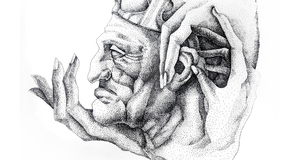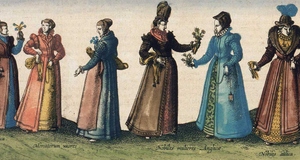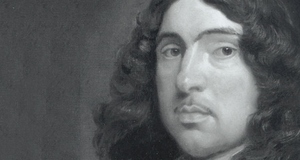Shakespeare's King Lear: The Promised End
By
2012, Vol. 4 No. 09 | pg. 1/1
KEYWORDS:
William Shakespeare's King Lear begins with Lear ignoring the natural order of family inheritance by deciding to divide his kingdom amongst his three daughters before his death.. Typical of human nature, Lear is swayed by the sycophantic flattery of his two eldest daughters, Goneril and Regan, while his true and loving daughter, Cordelia, is left out in the cold. The most notable aspect of human nature present in this play is greed, something Lear’s two eldest daughters, their husbands, and assuredly Edmund suffer from. Even Lear himself divides his kingdom for a greedy reason, wanting all of the perks of being king, but none of the responsibility. The sweet, innocent Cordelia stands little chance against the treachery of her sisters. There is no reward for being “good” in the play, leading you to believe that God has no hand in the events that take place. Instead it is nature that governs the outcome, a sort of Darwinian survival of the fittest in which the most desirable qualities are avarice and deception. Although the play takes place before the rise of Christianity, it was written for a Christian audience. Many English protestants believed that God had a plan for everyone and that everything that happens in the universe occurs for a reason and will eventually lead to a greater good. In this play however, this belief is notably absent. There is no happy ending where good triumphs over evil, except Edgar’s defeat of Edmund, which is not enough to save Cordelia in the end. Edgar’s defeat of Edmund is in itself fratricide, reminiscent of the biblical Cain and Able, even though they are only half brothers. What happens in the play does not seem directed towards any greater good, by the end of the play the king and all of his daughters are dead, leaving England under control of Albany or Edgar. Instead the play is directed by the greed of men and women who want happiness, but have done nothing to deserve it. The tragic ending of the play reflects a nihilistic viewpoint where there is no promised end outside of chaos and death. By dividing up his kingdom King Lear wishes to give up the responsibility of being king, but keep all of the benefits. This is another form of greed, different from his daughters, but still clearly wrong. This wish to retain his power is made evident by Lear banishing Kent shortly after stepping down from the throne: Hear me, recreant, on thine allegiance hear me!That though has sought to make us break our vows, Which we durst never yet, and with strained pride To come betwixt our sentence and our power, Which nor our nature nor our place can bear (1.1.170-174) It is ironic that Lear mentions nature here because it is he who goes against it and the natural order of things by dividing his kingdom before his death. He has gone against his natural father daughter bond by banishing Cordelia and he now uses power he no longer has to banish Kent from the kingdom. Lear feeds into his daughter’s greed by describing his kingdom in natural terms when giving Goneril her portion of the lands, “Of all these bounds, even from this line to this,/ With shadowy forests and with champains riched,/ With plenteous rivers and wide-skirted meads, (1.1.63-65).” This also shows his relationship to and mastery of nature. His description of these bountiful natural resources only makes Goneril and Regan salivate more, hatching plots to outdo each other and win a bigger piece of land. When Cordelia refuses to flatter her father in the same way that her sisters did King Lear once again invokes nature to banish her from the kingdom, “For, by the sacred radiance of the sun,/ The mysteries of Hecate and the night,/ By all the operations of the orbs/From whom we do exist and cease to be,/ Here I disclaim all my paternal care,/Propinquity, and property of blood”(1.1.109-114). Here Lear calls upon nature to reject it at the same time, cutting ties with his own daughter. Nature is often personified in this play, a pagan god in the world of Lear. After banishing Kent, Lear proceeds to call Cordelia a “…wretch whom nature is ashamed/ Almost t’acknowledge hers (1.1.215-216).” But is it that bad to be something Nature is ashamed of in this context? In the world of Lear, nature is seen in a chaotic storm that also reflects Lear’s inner turmoil. Nature is not kind or forgiving, it doesn’t have human emotions like Cordelia. Cordelia stands for truth, refusing to build up her fathers ego and argue over silly things with her sisters like loves their father most. In nature the goal of life is about survival and the perpetuation of the species, and that means doing whatever it takes to benefit yourself, as both Goneril and Regan have done. But Cordelia separates herself from that, standing by very human things like truth and love instead of riches. The same Nature that Lear refers to is the same that Edmund swears his allegiance to. Edmund ignores the natural order of things, as decided by society, by attempting to take his brother Edgar’s rightful birthright. Despite Gloucester claiming to love them the same, Edmund still feels slighted. In his desire to take what he believes is his he is being more natural, using his skills of deception to best his brother and take his birth right, no matter what human laws may say. He addresses nature in the soliloquy where he lets us know of his evil intentions: Thou, Nature, art my goddess; to thy law/My services are bound. Wherefore should I/Stand in the plague of custom and permit/The curiosity of nations to deprive me, For that I am some twelve or fourteen moonshines/Lag of a brother? Why bastard? Wherefore base? (1.2.1-6) Edmund questions the natural progression of things and why he was dealt this terrible hand in life. He then misleads his father into thinking Edgar is trying to kill him, and Gloucester himself becomes so upset that he questions nature: These late eclipses in the sun and the moon Edmund’s plan comes to fruition after he betrays his father, turning his letter in to Cornwall. After Gloucester is blinded, Edmund receives his reward for his scheming, becoming the new Duke of Gloucester. This would lead you to believe that this natural societal order of things has lost out to a more bestial order. Lear clearly distinguishes the order of man and beast when he says, “Our basest beggars/Are in the poorest thing superfluous./ Allow not nature more than nature needs,/ Man’s life is cheap as beast’s. (2.4.266-269),” referring to man‘s greedy desire for unnecessary things. Goneril and Regan also have a bestial lust, not only for power, but also Edmund. It is the jealousy that flares up between them that leads to their deaths. The natural order, in a societal sense, is restored when in the death of these sisters, but also when Edgar reclaims his birthright by defeating Edmund in single combat. This is a small victory against the nature that has ravaged England throughout the play. Humanity still loses this war against nature because the rightful king, that of divine right, is dead, and so are his daughters. Cordelia is not a creature of greed like her sisters, but she does adhere to the “natural” order of things as far as the laws of man are concerned. She asks her father “Why have my sisters husbands if they say/ They love you all?(1.1.99-100).” At this time women became the property of the husbands upon marriage, so there was no way that Goneril and Regans could truly love either their father with their all. What really proves Cordelia’s love for her father is that she comes back to England to look for him, even after the harsh words and banishment he dealt upon her. Lear often describes human nature in terms of animals. Goneril, who has little patience for her father and his knights, casts him out of her court. He compares her to a bird of prey, “Detested kite, thou liest!”(1.4.262), calling her out for what she is. He is so upset by her lies that he wishes Nature would make her infertile and then compares her transgressions to the biblical creature that led to the fall of man, “How sharper than a serpent’s tooth it is/ To have a thankless child! (1.4.287-288).” He once again compares Goneril to a predatory animal when he says that Regan will “flay thy wolvish visage (1.4.307).” It is these comparisons that really get to the truth of the matter, where Lear wakes up and realizes that he has been used, and his power preyed upon. When he finds that both Goneril and Regan deny him and his knights lodging he himself is reduced to an animal’s level, because he has nothing left. He pledges his revenge, once again referencing nature and the earth, “No you unnatural hags,/ I will have such revenge on you both/That all the world shall-I will do such things-/What they are yet I know not, but they shall be/The terrors of the earth. You think I’ll weep; No, I’ll not weep.(2.4.280-285),” something he is not able to fulfill because the sisters receive punishment at their own hands. The King may not weep, but nature does in his place, forming a storm and tempest that reflects his inner agony, as if on cue. Here chaos exists in nature, as well as in the world of man-the kingdom is in shambles, and Lear is wandering the countryside. The only glimmer of hope is the return of Cordelia, but not really, because she brings the French with her, something the people in the audience were unlikely to support. The ties to nature continue until the tragic end. Albany becomes more sympathetic to Lear’s cause as time wears on and he discovers the infidelity of his wife. He too, compares Goneril to a snake, calling her a “gilded serpent” (5.3.86). Like the serpent was instrumental in the biblical fall of man, Goneril was instrumental in the destruction of Lear’s England. Aristotle said that tragedies require a admirable but flawed character as the lead, but there is little that redeems Leer. His time in the storm allows him to see where he has gone wrong, but he does little to change what he has begat. His greedy desire for the power of a monarch but none of the responsibility is what plunges the kingdom into a chaos. A chaos that can only be conquered by the death of most of the main characters, as in many other Shakespearian tragedies. Even the innocent Cordelia falls victim to this natural order propagated by greed. In this world good has no place, overwhelmed by the evil surrounding it. This fatalistic viewpoint is tragic in itself, but it is Lear’s appearance with Cordelia’s limp body in his arms that is most tragic of all. Lear sums up his bleak nihilistic view of the earth when he says, “I know when one is dead and when one lives;/ She’s dead as earth.(5.3.265-266).” There is no discussion of the afterlife or hope for the future, this is it. The tragedy in this outcome is so profound that later productions altered the ending because it was too depressing. It suggests that there is no purpose or meaning to human life, other than to return to the earth, the nature that Lear and Edmund put so much faith into. In this play the just and loving Christian God is not present and in its place is the cruel Nature. Living a virtuous life like Cordelia will only lead to the very same end as her sisters, death.
|

















